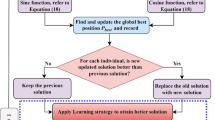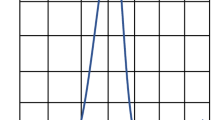Abstract
In this paper, a quantum-based sine cosine algorithm, named as Q-SCA, is proposed for solving general systems of nonlinear equations. The Q-SCA hybridizes the sine cosine algorithm (SCA) with quantum local search (QLS) for enhancing the diversity of solutions and preventing local optima entrapment. The essence of the proposed Q-SCA is to speed up the optimum searching operation and to accelerate the convergence characteristic. The proposed Q-SCA works in twofold: firstly, an improved version of SCA based on tuning the search space around the destination solution dynamically, so that the search space is shrunken gradually as the optima are attained. In addition, a new mechanism to update the solutions is introduced using bidirectional equations. Secondly, QLS is incorporated to improve the quality of the obtained solutions by the SCA phase. By this methodology, the proposed Q-SCA can achieve high levels of exploration/exploitation and precise stable convergence to high-quality solutions. The performance of the proposed algorithm is assessed by adopting twelve systems of nonlinear equations and two electrical applications. Furthermore, the proposed Q-SCA algorithm is applied on expensive large-scale problems including CEC 2017 benchmark and realistic optimal power dispatch (OPD) to confirm its scalability. Experimental results affirm that the Q-SCA is performs steadily, and it has a promising overall performance among several compared algorithms.









Similar content being viewed by others
References
Abdollahi M, Isazadeh A, Abdollahi D (2013) Imperialist competitive algorithm for solving systems of nonlinear equations. Comput Math Appl 65(12):1894–1908
Abdollahi M, Abdollahi D, Bouyer A (2016) Improved cuckoo optimization algorithm for solving systems of nonlinear equations. J Supercomput 72(3):1246–1269
Aydilek IB (2018) A hybrid firefly and particle swarm optimization algorithm for computationally expensive numerical problems. Applied Soft Comput 66:232–249
Biswas PP, Suganthan PN, Mallipeddi R, Amaratunga GA (2018) Optimal power flow solutions using differential evolution algorithm integrated with effective constraint handling techniques. Eng Appl Artif Intell 68:81–100
Bouchekara HREH (2014) Optimal power flow using black-hole-based optimization approach. Appl Soft Comput 24:879–888
Dai J, Wu G, Wu Y, Zhu G (2008) Helicopter trim research based on hybrid genetic algorithm. In: World congress on intelligent control and automation, p 2007–2011. IEEE
Daryani N, Hagh MT, Teimourzadeh S (2016) Adaptive group search optimization algorithm for multi-objective optimal power flow problem. Appl Soft Comput 38:1012–1024
Das S, Suganthan P (2011) Differential evolution: a survey of the state of-the-art. IEEE Trans Evol Comput 15(1):4–31
Dorigo M, Maniezzo V, Colorni A (1996) The ant system: optimization by a colony of cooperating agents. IEEE Trans Syst Man Cybern B Cybern 26(1):29–41
El-Sawy AA, Zaki EM, Rizk-Allah RM (2013) Novel hybrid ant colony optimization and firefly algorithm for multi-objective optimization problems. Int J Math Arch 4(1):152–161
El-Sawy AA, Zaki EM, Rizk-Allah RM (2013) A novel hybrid ant colony optimization and firefly algorithm for solving constrained engineering design problems. J Nat Sci Math 6(1):1–22
Floudas CA, Pardalos PM, Adjiman CS, Esposito WR, Gumus ZH, Harding ST, Klepeis JL, Meyer CA, Schweiger CA (1999) Handbook of test problems in local and global optimization. Kluwer Academic Publishers, Dordrecht
Garcia S, Fernandez A, Luengo J, Herrera F (2009) A study of statistical techniques and performance measures for genetics-based machine learning, accuracy and interpretability. Soft Comput 13:959–977
Goyel M (2007) Computer-based numerical & statistical techniques. Infinity Science Press LLC, Hingham
Grosan C, Abraham A (2008) A new approach for solving nonlinear equations systems. IEEE Trans Syst Man Cybern part A 38(3):698–714
Hashim FA, Houssein EH, Mabrouk MS, Al-Atabany W, Mirjalili S (2019) Henry gas solubility optimization: a novel physics-based algorithm. Future Generation Computer Systems 101:646–667
Hoffman JD (2001) Numerical methods for engineers and scientists, 2nd edn. Marcel Dekker, New York
Holland J (1975) Adaptation in natural and artificial systems. University of Michigan Press, Ann Arbor
Jaberipour M, Khorram E, Karimi B (2011) Particle swarm algorithm for solving systems of nonlinear equations. Comput Math Appl 62(2):566–576
Jaeger G (2006) Quantum information: an overview. Springer, Berlin
Jäger C, Ratz D (1995) A combined method for enclosing all solutions of nonlinear systems of polynomial equations. Reliab Comput 1(1):41–64
Kelley CT (2003) Solving nonlinear equations with Newton’s method, vol 1. SIAM, Philadelphia
Kennedy J, Eberhart R (1995) Particle swarm optimization. Proc IEEE Int Conf Neural Netw 4:1942–1948
Kumar AR, Premalatha L (2015) Optimal power flow for a deregulated power system using adaptive real coded biogeography-based optimization. Int J Electr Power Energy Syst 73:393–399
Luo YZ, Tang GJ, Zhou LN (2008) Hybrid approach for solving systems of nonlinear equations using chaos optimization and quasi-Newton method. Appl Soft Comput 8(2):1068–1073
Mo Y, Liu H, Wang Q (2009) Conjugate direction particle swarm optimization solving systems of nonlinear equations. Comput Math Appl 57(11):1877–1882
Mohamed AAA, Mohamed YS, El-Gaafary AAM, Hemeida AM (2017) Optimal power flow using moth swarm algorithm. Elec Power Syst Res 142:190–206
Oliveira HA, Petraglia A (2013) Solving nonlinear systems of functional equations with fuzzy adaptive simulated annealing. Appl Soft Comput 13(11):4349–4357
Ouyang A, Zhou Y, Luo Q (2009) Hybrid particle swarm optimization algorithm for solving systems of nonlinear equations. In: International conference on granular computing, GRC’09, p 460–465. IEEE
Pan WT (2012) A new fruit fly optimization algorithm: taking the financial distress model as an example. Knowl-Based Syst 26(2):69–74
Pulluri H, Naresh R, Sharma V (2018) A solution network based on stud krill herd algorithm for optimal power flow problems. Soft Comput 22(1):159–176
Rizk-Allah MR, Hassanien AE (2018c) New binary bat algorithm for solving 0–1 knapsack problem. Complex Intell Syst 4(1):31–53
Rizk-Allah MR (2018d) An improved sine cosine algorithm based on orthogonal parallel information for global optimization. Soft Comput. https://doi.org/10.1007/s00500-018-3355-y
Rizk-Allah RM (2014) A novel multi-ant colony optimization for multi-objective resource allocation problems. Int J Math Arch 5(9):183–192
Rizk-Allah RM (2016a) An improved firefly algorithm based on local search method for solving global optimization problems. Int J Manag Fuzzy Syst 2(6):51–57
Rizk-Allah RM (2016b) Hybridization of fruit fly optimization algorithm and firefly algorithm for solving nonlinear programming problems. Int J Swarm Intel Evol Comput 5(2):1–10
Rizk-Allah RM (2018) Hybridizing sine cosine algorithm with multi-orthogonal search strategy for engineering design problems. J Comput Des Eng 5(2):249–273
Rizk-Allah RM, Zaki EM, El-Sawy AA (2013) Hybridizing ant colony optimization with firefly algorithm for unconstrained optimization problems. Appl Math Comput 224(1):473–483
Rizk-Allah RM, El-Sehiemy RA, Deb S, Wang GG (2017) A novel fruit fly framework for multi-objective shape design of tubular linear synchronous motor. J Supercomput 73(3):1235–1256
Rizk-Allah RM, Hassanien AE, Bhattacharyya S (2018) Chaotic crow search algorithm for fractional optimization problems. Appl Soft Comput 71:1161–1175
Rizk-Allah RM, El-Sehiemy RA, Wang GG (2018) A novel parallel hurricane optimization algorithm for secure emission/economic load dispatch solution. Appl Soft Comput 63:206–222
Rizk-Allah RM, Hassanien AE, Elhoseny M, Gunasekaran M (2019) A new binary salp swarm algorithm: development and application for optimization tasks. Neural Comput Appl 31(5):1641–1663
Saadat H (1999) Power system analysis. McGraw-Hill, United States
Seyedali Mirjalili SCA (2016) A sine cosine algorithm for solving optimization problems. Knowl-Based Syst 96:120–133
Sharma JR, Arora H (2013) On efficient weighted-Newton methods for solving systems of nonlinear equations. Appl Math Comput 222:497–506
Sun J, Xu W, Feng B (2005) Adaptive parameter control for quantum-behavedparticle swarm optimization on individual level. Int Conf Syst, Man Cyber 4:3049–3054
Turgut OE, Turgut MS, Coban MT (2014) Chaotic quantum behaved particle swarm optimization algorithm for solving nonlinear system of equations. Comput Math Appl 68(4):508–530
Wang C, Luo R, Wu K, Han B (2011) A new filled function method for an unconstrained nonlinear equation. J Comput Appl Math 235(6):1689–1699
Wang G-G, Gandomi AH, Yang X-S, Alavi AH (2014) A novel improved accelerated particle swarm optimization algorithm for global numerical optimization. Eng Comput 31(7):1198–1220. https://doi.org/10.1108/EC-10-2012-0232
Warid W (2020) Optimal power flow using the AMTPG-Jaya algorithm. Appl Soft Comput 91:106252
Wolpert DH, Macready WG (1997) No free lunch theorems for optimization. IEEE Trans Evol Comput 1(1):67–82
Wu Z, Kang L (2003) A fast and elitist parallel evolutionary algorithm for solving systems of non-linear equations. Proc Congr Evolut Comput 2:1026–1028
Wu J, Cui Z, Liu J (2011) Using hybrid social emotional optimization algorithm with metropolis rule to solve nonlinear equations. In: IEEE 10th International conference on cognitive informatics and cognitive computing (ICCI-CC'11), p 405-411. IEEE
Xi M, Sun J, Xu W (2008) An improved quantum-behaved particle swarm optimization algorithm with weighted mean best position. Appl Math Comput 205(2):751–759
Yang XS (2010) Engineering optimisation: an introduction with metaheuristic applications. Wiley, New York
Yuan G, Lu X (2008) A new backtracking inexact BFGS method for symmetric nonlinear equations. Comput Math Appl 55(1):116–129
Zouache D, Nouioua F, Moussaoui A (2016) Quantum-inspired firefly algorithm with particle swarm optimization for discrete optimization problems. Soft Comput 20(7):2781–2799
Author information
Authors and Affiliations
Corresponding author
Additional information
Publisher's Note
Springer Nature remains neutral with regard to jurisdictional claims in published maps and institutional affiliations.
Rights and permissions
About this article
Cite this article
Rizk-Allah, R.M. A quantum-based sine cosine algorithm for solving general systems of nonlinear equations. Artif Intell Rev 54, 3939–3990 (2021). https://doi.org/10.1007/s10462-020-09944-0
Published:
Issue Date:
DOI: https://doi.org/10.1007/s10462-020-09944-0




